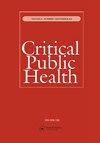警察和公共卫生干预性工作者的生活:死亡政治集会和社会正义的替代愿景
IF 2.3
3区 医学
Q2 PUBLIC, ENVIRONMENTAL & OCCUPATIONAL HEALTH
引用次数: 3
摘要
摘要尽管大量文献记录了刑事定罪如何损害性工作者的健康和权利,但有限的研究批判性地考察了刑事司法、健康和其他系统之间的互动如何影响对性交易者的支持和正义。我们通过与英国东伦敦的性工作者和其他利益相关者进行参与性、定性研究来解决这个问题。除了直接和结构性的暴力执法行为外,我们还发现了更广泛的、致命的政治集会和做法,包括警察、地方和移民当局,卫生和社会服务——在性工作治理的紧张局势中,约束性工作者的生活,让他们对自己的健康负责,并为基于现实生活的专业服务提供资金。这些影响基于社区和脆弱性的观念,这些观念往往使居民对性工作者的安全和健康威胁感到担忧,对被边缘化和少数族裔的顺性别和跨性别女性的影响最大。那些在街头工作和吸毒的人、移民和/或有色人种妇女尤其是执法的目标,在报告暴力行为时被忽视,并受到服务削减的影响。然而,参与者呼吁将资金从执法转向尊重他人、由同行主导的服务,这反映了他们对社会正义的主张。我们建议(重新)委托卫生和支持服务,与性工作者一起或由他们来应对性工作者的不同现实,同时共同努力结束将其定罪、惩罚和指责的政策和做法。这将有助于减轻我们记录的健康和社会危害,支持包容性参与健康和更广泛的社会正义目标。本文章由计算机程序翻译,如有差异,请以英文原文为准。
Policing and public health interventions into sex workers’ lives: necropolitical assemblages and alternative visions of social justice
ABSTRACT While extensive literature documents how criminalisation harms sex workers’ health and rights, limited research has critically examined how interactions between criminal-justice, health, and other systems shape support and justice for and by people who sell sex. We attend to this question by drawing on participatory, qualitative research with a diverse group of sex workers and other stakeholders in East London, UK. In addition to directly and structurally-violent enforcement practices, we identified wider, necropolitical assemblages and practices – across police, local and immigration authorities, health and social services – that disciplined sex workers’ lives, responsibilised them for their health, and defunded specialist services grounded in lived realities, amid tensions over sex-work governance. These effects – grounded in notions of community and vulnerability that often privileged residents’ concerns over threats to sex workers’ safety and health – impacted marginalised and minoritised cis and trans women the most. Those who worked on the street and used drugs, were migrants, and/or women of colour were particularly targeted for enforcement, discounted when reporting violence and impacted by service cuts. Yet participants’ appeals for redirection of funds from enforcement towards respectful, peer-led services reflected claims to social justice on their own terms. We recommend (re)commissioning health and support services that respond to sex workers’ diverse realities, with and by them, alongside concerted efforts to end policies and practices that criminalise, punish, and blame. This would help to alleviate the health and social harms that we document, in support of inclusive participation in health and broader social justice goals.
求助全文
通过发布文献求助,成功后即可免费获取论文全文。
去求助
来源期刊

Critical Public Health
Multiple-
CiteScore
5.90
自引率
7.10%
发文量
36
期刊介绍:
Critical Public Health (CPH) is a respected peer-review journal for researchers and practitioners working in public health, health promotion and related fields. It brings together international scholarship to provide critical analyses of theory and practice, reviews of literature and explorations of new ways of working. The journal publishes high quality work that is open and critical in perspective and which reports on current research and debates in the field. CPH encourages an interdisciplinary focus and features innovative analyses. It is committed to exploring and debating issues of equity and social justice; in particular, issues of sexism, racism and other forms of oppression.
 求助内容:
求助内容: 应助结果提醒方式:
应助结果提醒方式:


